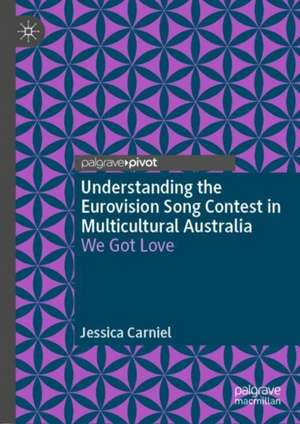Understanding the Eurovision Song Contest in Multicultural Australia: We Got Love
Autor Jessica Carnielen Limba Engleză Hardback – 20 noi 2018
Preț: 416.71 lei
Nou
Puncte Express: 625
Preț estimativ în valută:
79.74€ • 83.46$ • 66.37£
79.74€ • 83.46$ • 66.37£
Carte tipărită la comandă
Livrare economică 31 martie-14 aprilie
Preluare comenzi: 021 569.72.76
Specificații
ISBN-13: 9783030023140
ISBN-10: 3030023141
Pagini: 116
Ilustrații: V, 123 p.
Dimensiuni: 148 x 210 mm
Greutate: 0.31 kg
Ediția:1st ed. 2018
Editura: Springer International Publishing
Colecția Palgrave Pivot
Locul publicării:Cham, Switzerland
ISBN-10: 3030023141
Pagini: 116
Ilustrații: V, 123 p.
Dimensiuni: 148 x 210 mm
Greutate: 0.31 kg
Ediția:1st ed. 2018
Editura: Springer International Publishing
Colecția Palgrave Pivot
Locul publicării:Cham, Switzerland
Cuprins
Chapter 1 - Introduction.- Chapter 2 - A tale of two broadcasters: the EBU and SBS.- Chapter 3 - Aussie-fying Eurovision: local commentary as media interpolation.- Chapter 4 - Part of the party: celebrating Eurovision together.- Chapter 5 - ‘We’re a nation of proud multicultural dags’: multiculturalism and viewer identities.- Chapter 6 - From Mr Eurovision to Australian Idols: Australian performances (and performing Australia).- Chapter 7 - “Every region of the world should have a -Vision”: Eurovision in the Asian century.- Chapter 8 - Epilogue.
Notă biografică
Jessica Carniel is Senior Lecturer in Humanities at the University of Southern Queensland, Toowoomba, Australia. Understanding the Eurovision Song Contest in Multicultural Australia draws together her ongoing research interests in migration, multiculturalism, and popular culture with her lifelong fandom of the contest.
Textul de pe ultima copertă
This book presents the first in-depth study of the Eurovision Song Contest from an Australian perspective. Using a cultural studies approach, the study draws together fan interviews and surveys with media and textual analysis of the contest itself. In doing so, it begins to answer the question of why the European song contest appeals to viewers in Australia. It explores and challenges the dominant narrative that links Eurovision fandom to post-WWII European migration, arguing that this Eurocentric narrative presents a limited view of how contemporary Australian multicultural society operates in the context of globalized culture. It concludes with a consideration of the future of the Eurovision Song Contest as Australia enters into the ‘Asian century’.
Caracteristici
Provides the first detailed study of the Eurovision Song Contest in Australia Contributes to a wider understanding of the intersection of multiculturalism and popular culture Offers an understanding of local and global political, social and cultural concerns
